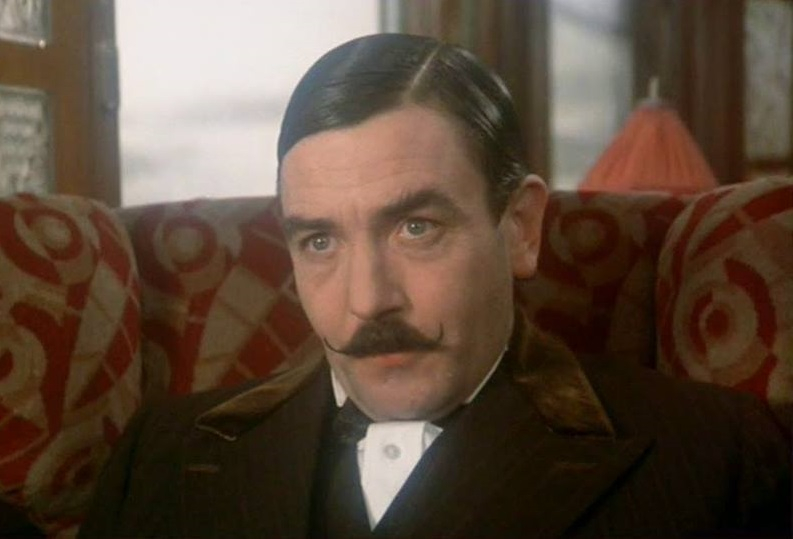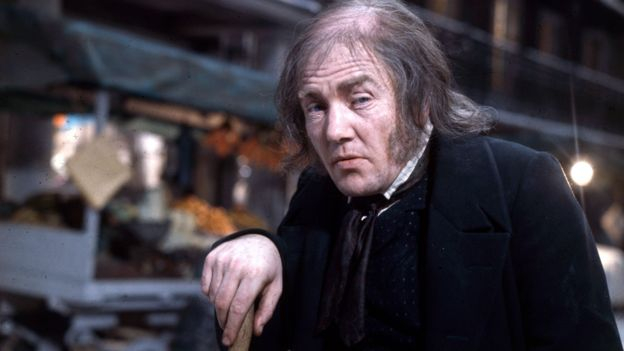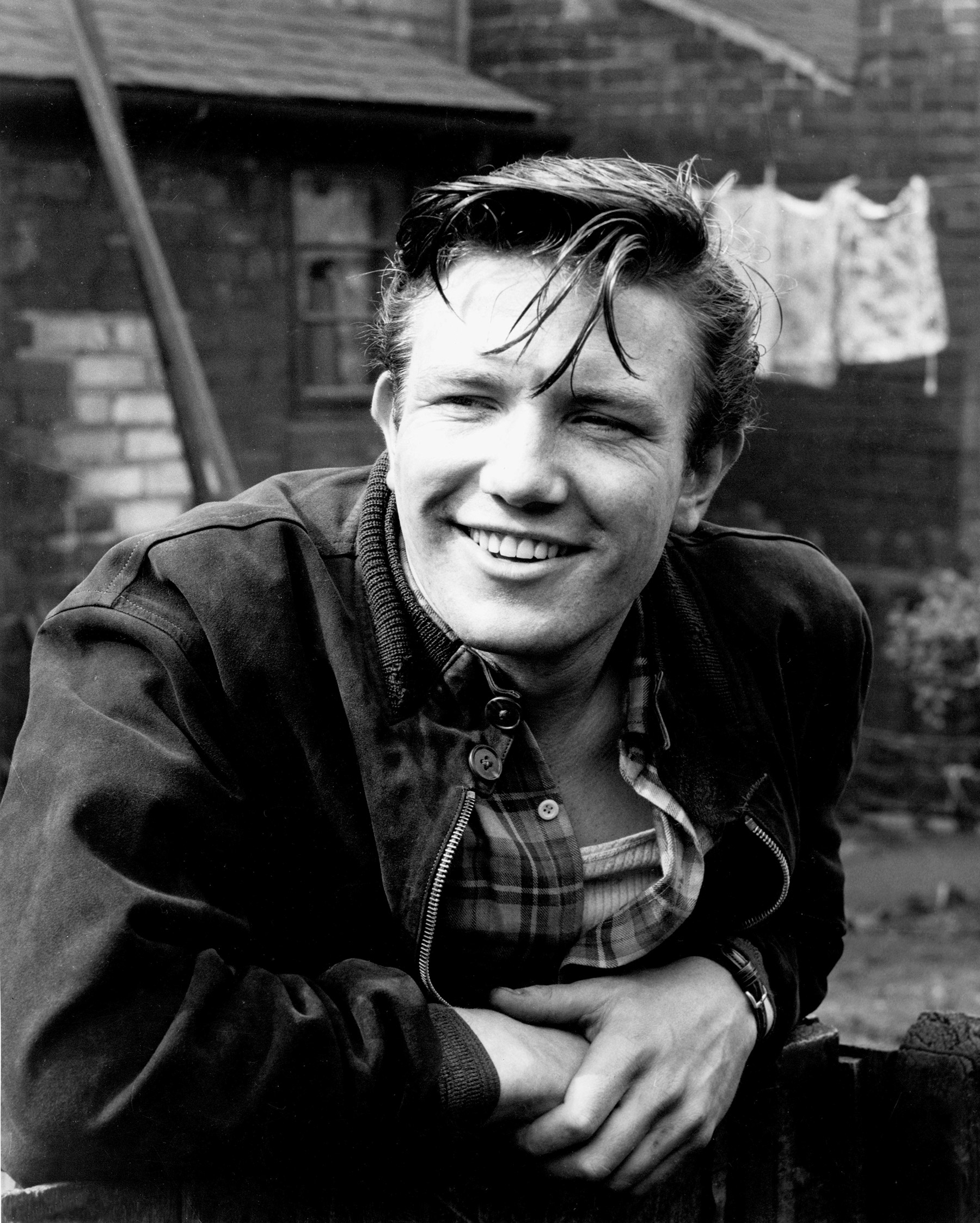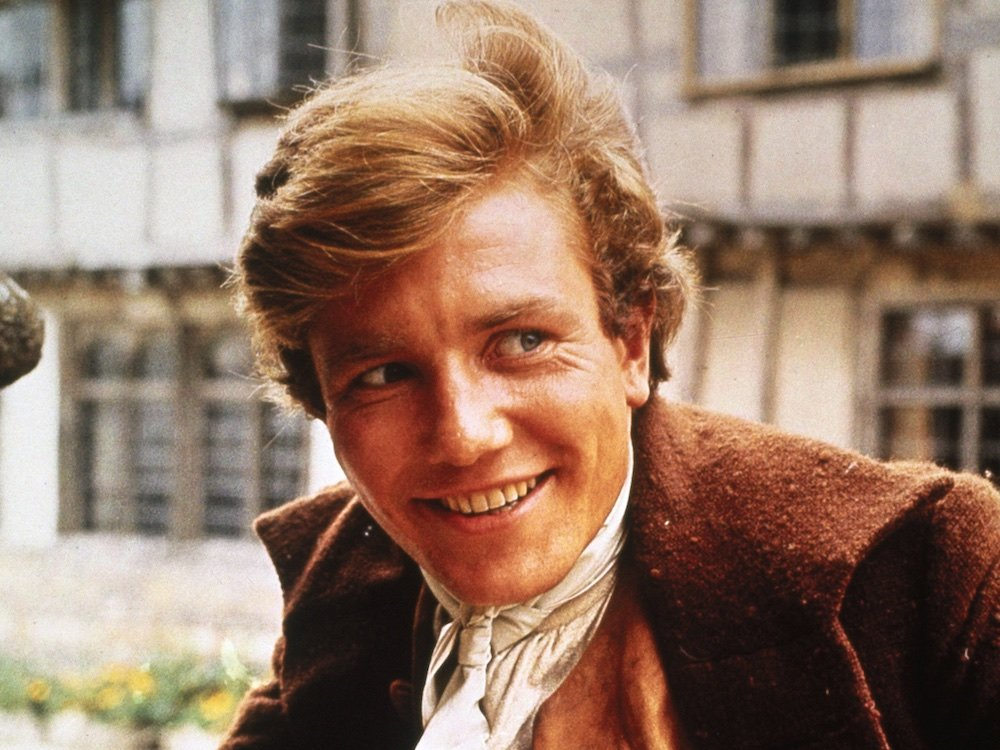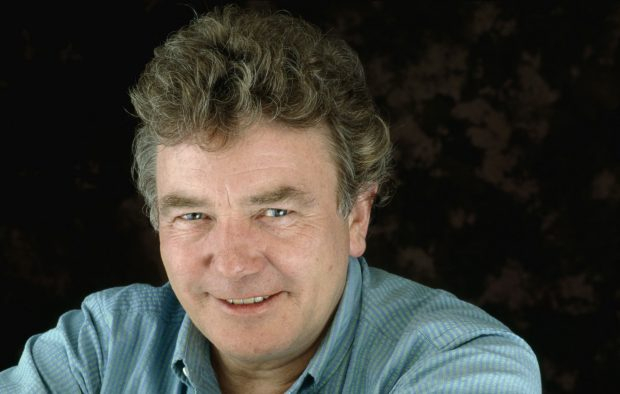Early life
Finney was born in Salford, Lancashire, the son of Alice (née Hobson) and Albert Finney, a bookmaker. He was educated at Tootal Drive Primary School, Salford Grammar School, and the Royal Academy of Dramatic Art (RADA), from which he graduated in 1956.
Early career
While at RADA Finney made an early TV appearance playing Mr Hardcastle in Oliver Goldsmith's She Stoops to Conquer. The BBC filmed and broadcast the RADA students' performances at the Vanbrugh Theatre in London on Friday 6 January 1956.
Other members of the cast included Roy Kinnear and Richard Briers Finney graduated from RADA and became a member of the Royal Shakespeare Company.
Finney was offered a contract by the Rank Organisation but turned it down to perform for the Birmingham Rep. He was in a production of The Miser for Birmingham Rep, which was filmed for the BBC in 1956. Also for the BBC he appeared in The Claverdon Road Job (1957) and View Friendship and Marriage (1958). At Birmingham, he played the title role in Henry V, and in 1958, made his London stage debut in Jane Arden's The Party, directed by Charles Laughton, who starred in the production along with his wife, Elsa Lanchester. In 1959 Finney appeared at Stratford in the title role in Coriolanus, replacing an ill Laurence Olivier. Finney guest starred on several episodes of Emergency-Ward 10 and was Lysander in a TV version of A Midsummer Night's Dream (1959) directed by Peter Hall.
Finney's first film appearance was in Tony Richardson's The Entertainer (1960), with Laurence Olivier. Finney and Alan Bates played Olivier's sons. He made his film breakthrough in the same year with his portrayal of a disillusioned factory worker in Karel Reisz's film version of Alan Sillitoe's Saturday Night and Sunday Morning (1960), produced by Richardson. The film was a box-office success, being the third most popular film in Britain that year. It earned over half a million pounds in profit.
Finney then did Billy Liar (1960) on stage and for British television. Finney had been chosen to play T. E. Lawrence in David Lean's production of Lawrence of Arabia after a successful and elaborate screen test that took four days to shoot.
However, Finney balked at signing a multi-year contract for producer Sam Spiegel and chose not to accept the role.
Finney created the title role in Luther, the 1961 play by John Osborne depicting the life of Martin Luther. He performed the role with the English Stage Company in London, Nottingham, Paris, and New York. The original West End run at the Phoenix ended in March 1962, after 239 performances there, when Finney had to leave the cast to fulfill a contractual obligation with a film company.
Tom Jones
Finney starred in the Academy Award-winning 1963 film Tom Jones, directed by Richardson and written by Osborne. The success of Tom Jones saw British exhibitors vote Finney the ninth most popular star at the box office in 1963.[13] Finney received 10% of the films earnings, which made him over $1 million.[14]
Finney followed this with a small part in the ensemble war movie The Victors (1963), which was not a success. He then made his Broadway debut in Luther in 1963. When that run ended he decided to take a year off and sail around the world. "People told me to cash in on my success while I was hot," he later said. "I'd been acting for about eight years and had only had one vacation ... Captain Cook had been a hero of mine when I was a kid, and I thought it would be exciting to go to some of the places in the Pacific where he'd been."
The success of Tom Jones enabled Finney to produce his next film, Night Must Fall, in 1964, which he also starred in and which was directed by Reisz. A remake of the classic 1937 film of the same title, the film was a flop and Finney's performance received poor reviews.
1963–1974
Finney in 1966
Finney undertook a season of plays at the Royal National Theatre, including Miss Julie by August Strindberg in 1965.
He returned to films with Two for the Road (1967) co-starring Audrey Hepburn.
He and Michael Medwin formed a production company, Memorial Productions, which made Privilege (1967), directed by Peter Watkins; The Burning (1968), a short directed by Stephen Frears; and If.... (1968), directed by Lindsay Anderson. Memorial also did stage productions, such as A Day in the Death of Joe Egg, which Finney performed in London and then on Broadway.
Memorial also produced some in which Finney did not appear, such as Spring and Port Wine and The Burglar.
Memorial then made Charlie Bubbles (1968), which Finney starred in and also directed. Liza Minnelli made her feature debut in the film.[19] Finney later called it "the most intense sense of creation I've ever had."
Finney starred in The Picasso Summer in 1969 and played the title role in the musical Scrooge in 1970.
Finney then made Gumshoe (1971), the first feature film directed by Stephen Frears, for Memorial. Memorial continued to produce films in which Finney did not appear: Spring and Port Wine (1970), with James Mason; Loving Memory (1971), an early directorial effort from Tony Scott; Bleak Moments (1971), the first feature from Mike Leigh; O Lucky Man! (1973) for Anderson; and Law and Disorder (1974); shot in Hollywood.
In 1972 Finney returned to the stage after a six-year absence with Alpha Beta, which he later filmed for TV with Rachel Roberts.
Memorial Productions pulled out of producing and Finney focused on acting. "It was OK at first," he later said, "but in the end it was sitting in an office, pitching ideas to Hollywood and waiting for the phone to ring."
Murder on the Orient Express
Finney played Agatha Christie's Belgian master detective Hercule Poirot in the film Murder on the Orient Express (1974). Finney became so well known for the role that he complained that it typecast him for a number of years, "People really do think I am 300 pounds with a French accent", he said.
He received nominations for the Academy Award for Best Actor and the BAFTA Award for Best Actor in a Leading Role.
He announced he intended to direct a film, The Girl in Melanie Klein, for Memorial, but it was not made.
Finney decided to take time off from features and focus on stage acting, doing classics at the National Theatre in London. "I felt that it needed commitment," he later said. "When you're making movies all the time, you stop breathing. You literally don't breathe in the same way that you do when you're playing the classics. When you have to deliver those long, complex speeches on stage, you can't heave your shoulders after every sentence. The set of muscles required for that kind of acting need to be trained. I really wanted to try and do justice to my own potential in the parts. I didn't want to be a movie actor just dropping in, doing Hamlet and taking off again. I wanted to feel part of the company."[5]
Finney was at the National for over three years[when?] during which he played in Hamlet, Macbeth, Tamburlaine, and plays by Anton Chekhov.[5]
Finney made a TV film Forget-Me-Not-Lane in 1975, which was written by Peter Nichols, and he also performed a cameo role in The Duellists (1977), the first feature directed by Ridley Scott. He also released an album through Motown.
1980s
Finney had not played a lead role in a feature film in six years and started to think about returning to cinema. The last two successful films he had made were Scrooge and Orient Express in which he was heavily disguised. "Most Americans probably think I weigh 300 pounds, have black hair and talk with a French accent like Hercule Poirot," said Finney. "So I thought they should have a look at me while I was still almost a juvenile and kind of cute."
Finney decided to make six films in succession "so that I could relax and get back into it again. In order to feel really assured and comfortable in front of a camera, you've got to do it for a while."
The first three were thrillers: Loophole (1981), with Susannah York; Wolfen (1981), directed by Michael Wadleigh; and Looker (1981), written and directed by Michael Crichton.
He received excellent reviews for his performance in the drama Shoot the Moon (1982). Finney said the role "required personal acting; I had to dig into myself. When you have to expose yourself and use your own vulnerability, you can get a little near the edge."
Less well received was his performance as Daddy Warbucks in the Hollywood film version of Annie (1982), which was directed by John Huston. Finney said going into this film after Shoot the Moon was "marvelous. I use a completely different side of myself as Warbucks. Annie is show biz; it's open, simple, and direct. It needs bold, primary colors. I don't have to reveal the inner workings of the character, and that's a relief."
Finney starred in Peter Yates-directed film The Dresser (1983) as Sir, a deteriorating veteran actor struggling through a difficult performance of King Lear. He earned nominations for the Academy Award for Best Actor, the BAFTA Award for Best Actor in a Leading Role, and the Golden Globe Award for Best Actor – Motion Picture Drama. He then played the title role in the TV movie Pope John Paul II (1984), his American television debut.
Huston cast Finney in the lead role of Under the Volcano (1984), which earned both men great acclaim, including another Best Actor Oscar nomination for Finney.
Finney played the lead role of Sydney Kentridge in The Biko Inquest, a 1984 dramatization of the inquest into the death of Steve Biko which was filmed for television following a London run.
Finney performed on stage in Orphans in 1986, then did the film version, directed by Alan J. Pakula.
He had the lead in a television miniseries, The Endless Game (1989), written and directed by Bryan Forbes.
1990s
Finney began the 1990s with the lead role in a film for HBO, The Image (1990). He received great acclaim playing the gangster boss in Miller's Crossing (1990), replacing Trey Wilson shortly before filming.
Finney made an appearance at Roger Waters' The Wall – Live in Berlin (1990), where he played "The Judge" during the performance of "The Trial".[31]
Finney starred in the BBC TV serial The Green Man, based on the Kingsley Amis novel.
He followed it with The Playboys (1992) for Gillies MacKinnon; Rich in Love (1993) for Bruce Beresford; The Browning Version (1994) for Mike Figgis; A Man of No Importance (1994), for Suri Krishnamma; and The Run of the Country (1995) for Peter Yates. In 1994, Finney played a gay bus conductor in early 1960s Dublin in A Man of No Importance.
He had the lead role in Dennis Potter's final two plays, Karaoke (1996) and Cold Lazarus (both 1996). In the latter he played a frozen, disembodied head.
Finney did Nostromo (1997) for television, and Washington Square (1997) for Agnieszka Holland then made A Rather English Marriage (1998) with Tom Courtenay.[36] He had supporting roles in Breakfast of Champions (1999) and Simpatico (1999).
2000s
Finney had his biggest hit in several years with Erin Brockovich (2000), alongside Julia Roberts for Steven Soderbergh.
His portrayal of real-life California lawyer Edward L. Masry earned him a nomination for the Academy Award for Best Supporting Actor, his fifth and final Oscar nomination.
Finney had a cameo in Soderbergh's Traffic (2000) and played Ernest Hemingway in Hemingway, the Hunter of Death (2001) for TV.
He had the lead in Delivering Milo (2001) and in 2002 his critically acclaimed portrayal of Winston Churchill in The Gathering Storm won him the British Academy of Film and Television Arts (BAFTA), Emmy, and Golden Globe awards as Best Actor.
He also played the title role in the television series My Uncle Silas, based on the short stories by H. E. Bates, about a roguish but lovable poacher-cum-farm laborer looking after his great-nephew. The show ran for two series broadcast in 2001 and 2003.
Finney had a key role in Big Fish (2003) directed by Tim Burton, and did another cameo for Soderbergh in Ocean's Twelve (2004). He sang in Tim Burton's Corpse Bride (2005)[40] and the film of Aspects of Love (2005).
Finney was reunited with Ridley Scott in A Good Year (2006). He had support roles in Amazing Grace (2006), The Bourne Ultimatum (2007), and Before the Devil Knows You're Dead (2007). His final film role was in Skyfall (2012).
A lifelong supporter of Manchester United, Finney narrated the documentary Munich, about the air crash that killed most of the Busby Babes in 1958, which was shown on United's TV channel MUTV in February 2008.
Theatre
He received Tony Award nominations for Luther (1964) and A Day in the Death of Joe Egg (1968),[1] and also starred on stage in Love for Love, Strindberg's Miss Julie, Black Comedy, The Country Wife, Alpha Beta, Beckett's Krapp's Last Tape, Tamburlaine the Great, Another Time and, his last stage appearance, in 1997, "Art" by Yasmina Reza, which preceded the 1998 Tony Award-winning Broadway run.
He won an Olivier Award for Orphans in 1986 and won three Evening Standard Theatre Awards for Best Actor.
Finney never abandoned stage work and continued his association with the National Theatre Company in London, where he had performed in the mid-1960s in Shakespeare's Much Ado About Nothing at the Old Vic and Chekhov's The Cherry Orchard in the 1970s at the National Theatre.
Personal life and death
With his first wife, Jane Wenham, he had a son, Simon Finney, who works in the film industry as a camera operator.
In 1970, nearly a decade after his divorce from Wenham, Finney married French actress Anouk Aimée, a union that lasted eight years. He then married for the third and last time in 2006, to Penelope Delmage, who at the time was working as a travel agent. They remained together until Finney's death.
Finney in May 2011 publicly disclosed that he had been receiving treatment for kidney cancer.
According to a 2012 interview, he had been diagnosed with the disease five years earlier and had undergone surgery, followed by six rounds of chemotherapy. Finney died of a chest infection at the Royal Marsden Hospital on 7 February 2019; he was 82.
Acting credits
Film
Film performances Year Title Role Notes Refs.
1960 The Entertainer Mick Rice
1960 Saturday Night and Sunday Morning Arthur Seaton
1963 Tom Jones Tom Jones
1963 The Victors Russian Soldier
1964 Night Must Fall Danny
1967 Two for the Road Mark Wallace
1968 Charlie Bubbles Charlie Bubbles Also director
1969 The Picasso Summer George Smith
1970 Scrooge Ebenezer Scrooge
1971 Gumshoe Eddie Ginley
1973 Alpha Beta Frank Elliot
1974 Murder on the Orient Express Hercule Poirot
1975 The Adventure of Sherlock Holmes' Smarter Brother Man in opera audience Cameo; uncredited
1977 The Duellists Fouche
1981 Loophole Mike Daniels
1981 Wolfen Detective Dewey Wilson
1981 Looker Dr. Larry Roberts
1982 Shoot the Moon George Dunlap
1982 Annie Oliver 'Daddy' Warbucks
1983 The Dresser Sir
1984 Under the Volcano Geoffrey Firmin
1987 Orphans Harold
1990 Miller's Crossing Liam 'Leo' O'Bannon
1990 Roger Waters – The Wall – Live in Berlin The Judge
1992 The Playboys Constable Brendan Hegarty
1993 Rich in Love Warren Odom
1994 The Browning Version Andrew Crocker-Harris
1994 A Man of No Importance Alfred Byrne
1995 The Run of the Country Danny's Father
1997 Washington Square Dr. Austin Sloper
1999 Breakfast of Champions Kilgore Trout
1999 Simpatico Simms
2000 Erin Brockovich Ed Masry
2000 Traffic White House Chief of Staff
2001 Delivering Milo Elmore Dahl
2003 Big Fish Edward Bloom Sr.
2004 Ocean's Twelve Gaspar LeMarc Uncredited cameo
2005 Corpse Bride Finis Everglot Voice
2006 A Good Year Uncle Henry Skinner
2006 Amazing Grace John Newton
2007 The Bourne Ultimatum Dr. Albert Hirsch
2007 Before the Devil Knows You're Dead Charles Hanson
2012 The Bourne Legacy Dr. Albert Hirsch
2012 Skyfall Mr. Kincade Final film role
Television
Television performances Year Title Role Notes Refs.
1959 Emergency – Ward 10 Tom Fletcher 4 episodes
1968–1977 The Tonight Show Starring Johnny Carson Himself 2 episodes
1968–1977 The Merv Griffin Show Himself 2 episodes
1977 The Mike Douglas Show Himself 1 episode
1982 Late Night with David Letterman Himself 1 episode
1984 Pope John Paul II Karol Wojtyła, Pope John Paul II Television movie
1989 The Endless Game Agent, Alec Hillsden TV miniseries; 2 episodes
1990 The Image Jason Cromwell Television movie
1990 The Green Man Maurice Allington 3 episodes
1996 Karaoke Daniel Feeld 4 episodes
1996 Cold Lazarus Daniel Feeld 4 episodes
1997 Nostromo Dr. Monygham 4 episodes
1998 A Rather English Marriage Reggie Television movie
2001–2003 My Uncle Silas Uncle Silas 9 episodes
2002 The Gathering Storm Winston Churchill Television movie
Stage
Stage performances Year Title Role Theatre Refs.
1956 Henry V King Henry Birmingham Repertory Theatre
1957 The Lizard on the Rock Malcolm Birmingham Repertory Theatre
1958 The Party Soya New Theatre
1959 Coriolanus Coriolanus Royal Shakespeare Theatre
1961 Luther Martin Luther Royal Court Theatre
1963 Luther Martin Luther Lunt-Fontanne Theatre
1965 Black Comedy Harold Gorringe Old Vic Theatre
1965 Much Ado About Nothing Don Pedro Old Vic Theatre
1965–1966 Miss Julie Jean Old Vic Theatre
1966 A Flea in Her Ear Victor Emmanuel Chandebise Old Vic Theatre
1968 A Day in the Death of Joe Egg Bri Brooks Atkinson Theatre
1976 Hamlet Prince Hamlet Royal National Theatre
1976 Tamburlaine Tamburlaine Royal National Theatre
1978 The Cherry Orchard Lopakhin Royal National Theatre
1984 Serjeant Musgrave's Dance Serjeant Musgrave Old Vic Theatre
1986 Orphans Harold Apollo Theatre
1996 'Art' Marc Wyndham's Theatre
Awards and nominations
Finney declined the offer of a CBE in 1980, as well as a knighthood in 2000. He criticised such honours as "perpetuating snobbery".[61]
Year Association Category Nominated work Result Ref
1961 BAFTA Awards Best British Actor Saturday Night and Sunday Morning Nominated [62]
Most Promising Newcomer to Leading Film Roles Won [62]
National Board of Review Best Actor Won [63]
Mar del Plata International Film Festival Best Actor Won [64]
1964 Academy Awards Best Actor Tom Jones Nominated [65]
BAFTA Awards Best British Actor Nominated [66]
Golden Globe Awards Best Actor – Motion Picture Musical or Comedy Nominated [67]
New Star of the Year – Actor Won [67]
Tony Awards Tony Award for Best Actor in a Play Luther Nominated [68]
1968 A Day in the Death of Joe Egg Nominated [68]
1971 Golden Globe Awards Best Actor – Motion Picture Musical or Comedy Scrooge Won [67]
1972 BAFTA Awards Best Actor Gumshoe Nominated [69]
1975 Academy Awards Best Actor Murder on the Orient Express Nominated [70]
BAFTA Awards Best Actor Nominated [71]
1976 Olivier Awards Best Actor in a Revival Hamlet and Tamburlaine the Great Nominated [2]
1982 Saturn Awards Best Actor Wolfen Nominated [72]
1983 BAFTA Awards Best Actor Shoot the Moon Nominated [73]
Golden Globe Awards Best Actor – Motion Picture Drama Nominated [74]
1984 Academy Awards Best Actor The Dresser Nominated [75]
Golden Globe Awards Best Actor – Motion Picture Drama Nominated [76]
1985 Academy Awards Best Actor Under the Volcano Nominated [77]
BAFTA Awards Best Actor The Dresser Nominated [78]
Golden Globe Awards Best Actor – Motion Picture Drama Under the Volcano Nominated [79]
London Film Critics' Circle Awards Actor of the Year Won [80]
1986 Olivier Awards Best Actor Orphans Won [81]
1990 Primetime Emmy Awards Outstanding Lead Actor in a Miniseries or a Movie The Image Nominated [82]
1991 BAFTA TV Awards Best Actor on Television The Green Man Nominated [83]
1994 Boston Society of Film Critics Awards Boston Society of Film Critics Award for Best Actor The Browning Version Won [84]
1997 BAFTA TV Awards Best Actor on Television Cold Lazarus Nominated [85]
Karaoke Nominated [85]
1999 A Rather English Marriage Nominated [86]
2000 Boston Society of Film Critics Awards Boston Society of Film Critics Award for Best Supporting Actor Erin Brockovich Nominated [87]
2001 Academy Awards Best Supporting Actor Nominated [88]
BAFTA Awards Best Actor in a Supporting Role Nominated [89]
Blockbuster Entertainment Awards Favorite Supporting Actor – Drama Nominated [90]
Chicago Film Critics Association Awards Best Supporting Actor Nominated [91]
Golden Globe Awards Best Supporting Actor – Motion Picture Nominated [92]
London Film Critics' Circle Awards British Supporting Actor of the Year Won [93]
Online Film Critics Society Awards Best Supporting Actor Nominated [94]
Satellite Awards Best Supporting Actor – Motion Picture Nominated [95]
Screen Actors Guild Awards Outstanding Performance by a Cast in a Motion Picture Traffic Won [96]
Outstanding Performance by a Male Actor in a Supporting Role Erin Brockovich Won [96]
2002 Primetime Emmy Awards Outstanding Lead Actor in a Miniseries or a Movie The Gathering Storm Won [38]
2003 BAFTA TV Awards Best Actor on Television Won [97]
Broadcasting Press Guild Awards Best Actor Won [98]
Golden Globe Awards Best Actor – Miniseries or Television Film Won [99]
Satellite Awards Best Actor – Miniseries or Television Film Nominated [100]
Screen Actors Guild Awards Outstanding Performance by a Male Actor in a Miniseries or Television Movie Nominated [101]
2004 BAFTA Awards Best Actor in a Supporting Role Big Fish Nominated [102]
Golden Globe Awards Golden Globe Award for Best Supporting Actor – Motion Picture Nominated [103]
Saturn Awards Best Actor Nominated [104]
2007 Gotham Awards Best Ensemble Cast Before the Devil Knows You're Dead Won [105]
2008 Broadcast Film Critics Association Awards Best Cast Nominated [106]
London Film Critics' Circle Awards British Supporting Actor of the Year Nominated [107]
Other awards
Other awards include: a Golden Laurel for his work on Scrooge (1970) and for his work on Tom Jones, for which he was the 3rd Place Winner for the "Top Male Comedy Performance" for 1964. He was honoured by the Los Angeles Film Critics Association as Best Actor for Under the Volcano (which he tied with F. Murray Abraham for Amadeus),[108] the National Board of Review Best Actor award for Saturday Night and Sunday Morning,[63] and the New York Film Critics Circle Best Actor award for Tom Jones.[109]
Finney won two Screen Actors Guild Awards, for Best Performance by a Male Actor in a Supporting Role, for Erin Brockovich, and as a member of the acting ensemble in the film Traffic. He was also nominated for The Gathering Storm, for Best Performance by a Male Actor in a Television Movie or Miniseries, but did not win.[101][96]
He won the Silver Berlin Bear award for Best Actor, for The Dresser, at the 34th Berlin International Film Festival in 1984.[110]
He won the Volpi Cup for Best Actor, for Tom Jones, at the Venice Film Festival.[111]
References
"Obituary: Albert Finney". BBC News. 8 February 2019. Retrieved 8 February 2019.
Quentin Falk (1993). Albert Finney in Character: A Biography. Robson Books. ISBN 978-0-86051-823-5.
"Goldsmith Televised". The Stage. No. 3900. 12 January 1956. p. 12. Retrieved 10 February 2019 – via British Newspaper Archive.
"She Stoops to Conquer: Part 1". The Radio Times. No. 1677. 30 December 1955. p. 44. ISSN 0033-8060. Retrieved 10 February 2019.
Finney comes back to film Farber, Stephen. New York Times 26 July 1981: A.1.
Wife sues Albert Finney, The Guardian 7 July 1961: 19.
Laurence Olivier, Confessions of an Actor, Orion, 1994, p. 243
Tino Balio, United Artists: The Company That Changed the Film Industry, University of Wisconsin Press, 1987 p. 239
Finney: A Star Who Hides His Magnitude: Albert Finney, Marks, Sally K. Los Angeles Times 23 April 1967: c11.
"David Lean" by Stephen M. Silverman (Abrams, New York, 1992)
Taubman, Howard (26 September 1963). "Theater: 'Luther' Stars Albert Finney; John Osborne Drama Is at the St. James". The New York Times. Retrieved 9 February 2019.
"Luther to end its run next month", The Times, 16 February 1962, p. 15
"Most Popular Films Of 1963". The Times. London, England. 3 January 1964. p. 4.
"Finney's % of 'Tom Jones' Goes Over $1 Million". Variety. 21 October 1964. p. 1.
"Night Must Fall". Variety. 1 January 1964. Retrieved 29 January 2021.
"Cast List, Miss Julie and Black Comedy (1965)". Chichester Festival Theatre. Archived from the original on 6 April 2019. Retrieved 1 September 2021.
"Albert Finney". The Guardian. 15 March 1972. p. 10.
Zolotow, Sam (12 December 1967). "Albert Finney to Appear Here In 'Joe Egg,' a London Success: Simon Sells "Plaza Suite" Don't Drink" Will Move". The New York Times. p. 57.
Martin, Betty (21 October 1966). "Movie Call Sheet: 'Charlie' Next Film for Liza". Los Angeles Times. p. C16.
Gritten, David (21 April 2000). "Finney's fondness for the good life". The Ottawa Citizen. p. A14.
Hughes, David (28 December 2018). "Poirot actors: from David Suchet to Kenneth Branagh, the stars who've played Agatha Christie's sleuth". The Independent.
Sanders, Dennis and Len Lovallo. The Agatha Christie Companion: The Complete Guide to Agatha Christie's Life and Work, (1984), pgs. 438–441. Subscription required ISBN 978-0425118450
News of the Screen: ' Sugarland' Team For 'Clearwater' 5 Adaptations Set In Theater Series Finney to Direct Comedy on Lunacy By A. H. Weiler. New York Times 12 May 1974: 49.
Whither Albert Finney?: From Manchester to Motown Records Christon, Lawrence. Los Angeles Times 18 July 1977: f1.
Albert Finney stages a film comeback, Blume, Mary. Los Angeles Times 19 October 1980: p67.
Farber, Stephen (26 July 1981). "Finney comes back to film". The New York Times. Archived from the original on 5 September 2017. Retrieved 3 September 2017.
"Pope John Paul II". imdb.com. Taft Entertainment Television. 22 April 1984. Retrieved 29 January 2021.
O'Connor, John J. (12 September 1985). "TV review; 'The Biko Inquest' on Showtime". The New York Times. Retrieved 1 August 2018.
The Albert memorial, Billington, Michael. The Guardian 13 March 1986: 12.
Dixon, Wheeler W. (2001). Collected Interviews: Voices from Twentieth-century Cinema. SIU Press. ISBN 978-0-8093-2407-1. Retrieved 23 November 2019.
"The Trial – Rundfunk-Sinfonieorchester Leipzig". Genius. Retrieved 8 February 2019.
"Dorset On Screen: A Report On The Use Of Dorset As A Film-TV Location For The British Film Centenary 1996". South Central Media. Archived from the original on 24 March 2016. Retrieved 8 February 2019.
Wilmington, Michael. "Albert Finney Finds Significance on 'Man of No Importance'". chicagotribune.com.
Elley, Derek (19 June 1996). "Cold Lazarus". Variety. Retrieved 8 February 2019.
Cole, Simon (3 September 2010). "Dennis Potter's 'Karaoke' & 'Cold Lazarus' DVD review". Cult Box. Retrieved 8 February 2019.
Elley, Derek (23 November 1998). "A Rather English Marriage". Variety. Retrieved 8 February 2019.
Lyman, Rick (20 January 2003). "'Chicago,' 'Hours' Win Top Golden Globe Awards". The New York Times. Retrieved 8 February 2019.
"54th Emmy Awards Nominees and Winners". Emmys.com. Retrieved 8 February 2019.
"Albert Finney: a career in pictures". The Telegraph. 9 May 2016. Archived from the original on 11 January 2022. Retrieved 9 February 2019.
"Tim Burton's Corpse Bride". BBFC. Retrieved 8 February 2019.
Albert Finney remembers. Timesonline.co.uk. 5 February 2008
"Albert Finney: in Character". Quentin Falk. Robson Books. 2002.
Coveney, Michael (8 February 2019). "Albert Finney obituary". The Guardian. Retrieved 10 June 2020.
Barnes, Mike; Byrge, Duane (8 February 2019). "Albert Finney, Chameleon-Like Star of Stage and Screen, Dies at 82". The Hollywood Reporter. Retrieved 9 February 2019.
Eden, Richard (15 May 2011). "Film star Albert Finney won't let cancer grind him down". The Daily Telegraph. Archived from the original on 11 January 2022. Retrieved 2 April 2013.
Taylor, Paul (30 November 2012). "Actor Albert Finney – son of Salford – loves to come home". Manchester Evening News. Retrieved 2 April 2013.
"Actor Albert Finney dies aged 82". BBC News. BBC. 8 February 2019.
Guy, Jack (9 February 2019). "Albert Finney, five-time Oscar nominee, dead at 82". CNN.
Cowell, Alan (8 February 2019). "Albert Finney, 'Angry Young Man' Who Became a Hollywood Star, Dies at 82". The New York Times. Retrieved 8 February 2019.
"Filmography for Albert Finney". Turner Classic Movies. Retrieved 8 February 2019.
"Albert Finney List of Movies and TV Shows". TV Guide. Retrieved 8 February 2019.
"Emergency – Ward 10 (1957–67)". BFI. Retrieved 9 February 2019.
"Finney to make TV debut". Ottawa Citizen. Retrieved 9 February 2019.
"The Endless Game (1989)". Rotten Tomatoes. Retrieved 9 February 2019.
"Albert Finney – Credits". TV Guide. Retrieved 9 February 2019.
Moore, Gene M. (1997). Conrad on Film. Cambridge University Press. p. 249. ISBN 978-0-521-55448-0. Retrieved 9 February 2019.
FROM OUR SPECIAL CORRESPONDENT (10 July 1957). "John Hall's The Lizard on The Rock at Birmingham Rep". The Times (London). p. 5. Retrieved 14 May 2022.
Albert Finney Theatre Credits
Miss Julie
Art Wyndham's Theatre, London
Leppard, David; Winnett, Robert (21 December 2003). "Revealed: secret list of 300 who scorned honours". The Sunday Times. Archived from the original on 12 October 2022. Retrieved 1 September 2022.
"Film in 1961". awards.bafta.org. Retrieved 8 February 2019.
"National Board of Review – Best Actor". National Board of Review. Retrieved 9 February 2019.
"4º Festival". Mar Del Plata Film Fest (in Spanish). Archived from the original on 1 April 2019. Retrieved 9 February 2019.
"The 36th Academy Awards". Oscars.org. Retrieved 9 February 2019.
"Film in 1964". awards.bafta.org. Retrieved 8 February 2019.
"Albert Finney – Golden Globe Awards". Golden Globe Awards. Retrieved 9 February 2019.
"Albert Finney – Awards". Internet Broadway Database.
"Film in 1972". awards.bafta.org. Retrieved 8 February 2019.
"The 47th Academy Awards". Oscars.org. Retrieved 9 February 2019.
"Film in 1975". awards.bafta.org. Retrieved 8 February 2019.
"Academy of Science Fiction, Fantasy & Horror Films, USA – 1982 Awards". IMDB. Retrieved 9 February 2019.
"Film in 1983". British Academy of Film and Television Arts. Retrieved 9 February 2019.
"Winners & Nominees – 1983". HFPA. Retrieved 9 February 2019.
"The 56th Academy Awards". Oscars.org. Retrieved 9 February 2019.
"Winners & Nominees 1984". HFPA. Retrieved 9 February 2019.
"The 57th Academy Awards". Oscars.org. Retrieved 9 February 2019.
"Film in 1985". Bafta.org. Retrieved 9 February 2019.
"Winners & Nominees 1985". HFPA. Retrieved 9 February 2019.
"London Critics Circle Film Awards – 1985 Awards". IMDB. Retrieved 9 February 2019.
"Oliver Winners 1986". Oliver Awards. Archived from the original on 21 October 2013. Retrieved 9 February 2019.
"42nd Emmy Awards Nominees and Winners". Emmys.com. Retrieved 9 February 2019.
"Television – Actor in 1991". Bafta.org. Retrieved 9 February 2019.
"BSFC Winners 1990s". Boston Society of Film Critics. 27 July 2018. Retrieved 9 February 2019.
"Television – Actor in 1997". Bafta.org. Retrieved 9 February 2019.
"Television – Actor in 1999". Bafta.org. Retrieved 9 February 2019.
"Boston Society of Film Critics Awards – 2000 Awards". IMDB. Retrieved 9 February 2019.
"The 73rd Academy Awards". Oscars.org. Retrieved 9 February 2019.
"Actor in a Supporting Role in 2001". Bafta.org. Retrieved 9 February 2019.
"Blockbuster Entertainment Award – 2001 Awards". IMDB. Retrieved 9 February 2019.
"Chicago Film Critics Association Awards – 2001 Awards". IMDB. Retrieved 9 February 2019.
"Winners & Nominees 2001". HFPA. Retrieved 9 February 2019.
"London Critics Circle Film Awards – 2001 Awards". IMDB. Retrieved 9 February 2019.
"2000 Awards (4th Annual)". OFCS.org. 3 January 2012. Retrieved 9 February 2019.
"Satellite Awards – 2001 Awards". IMDB. Retrieved 9 February 2019.
"The 7th Screen Actors Guild Awards". SAG Awards. Retrieved 9 February 2019.
"Actor in 2003". Bafta.org. Retrieved 9 February 2019.
"Broadcasting Press Guild Awards – 2003". Broadcasting Press Guild. 31 December 2007. Retrieved 9 February 2019.
"Winners & Nominees 2003". HFPA. Retrieved 9 February 2019.
"Satellite Awards – 2003 Awards". IMDB. Retrieved 9 February 2019.
"The 9th Screen Actors Guild Awards". SAG Awards. Retrieved 9 February 2019.
"Actor in a Supporting Role in 2004". Bafta.org. Retrieved 9 February 2019.
"Winners & Nominees 2004". HFPA. Retrieved 9 February 2019.
"Saturn Award – 2004 Awards". IMDB. Retrieved 9 February 2019.
"Gotham Awards – 2007". Gotham.ifp.org. Archived from the original on 2 August 2016. Retrieved 9 February 2019.
"Broadcast Film Critics Association Awards – 2008 Awards". IMDB. Retrieved 9 February 2019.
Mitchell, Wendy. "Control, Atonement lead London Critics' Circle nominations". Screen Daily. Retrieved 9 February 2019.
"10th Annual Los Angeles Film Critics Association Awards". LAFCA. Archived from the original on 18 January 2015. Retrieved 9 February 2019.
Weiler, A.H. (31 December 1963). "Film Critics Vote 'Tom Jones' Best of Year; Finney Named Top Actor for Title Role – 'Hud' Honored Finney in 3d Film". The New York Times. Retrieved 9 February 2019.
"Berlinale: 1984 Prize Winners". berlinale.de. Archived from the original on 15 October 2013. Retrieved 26 November 2010.
"Venice Film Festival – 1963 Awards". IMDB. Retrieved 9 February 2019.
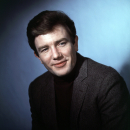
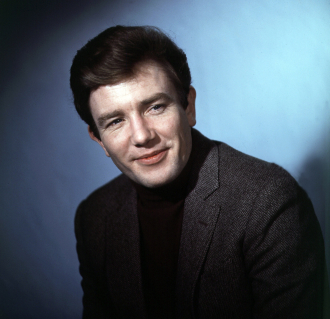
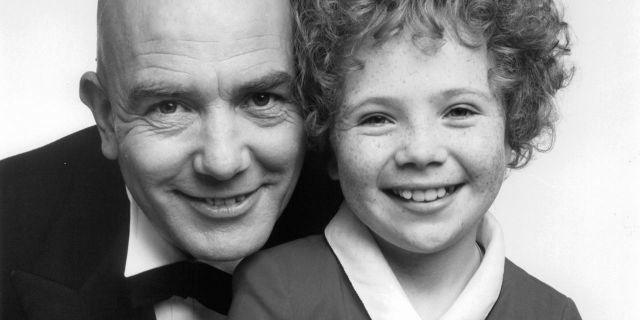
 Amanda S. Stevenson
Amanda S. Stevenson 